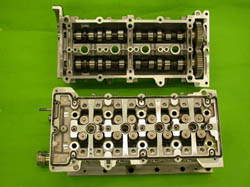Novel lubricants containing nanoparticles in their formulation
Lubricants reduce friction and reduce heat generation, protect against wear, remove wear debris and, in the case of engines, improve fuel economy while reducing emissions. With the advent of nanotechnology and characterisation of novel nanomaterials, lubrication is on the brink of another performance leap. Scientists initiated the EU-funded project ADDNANO with the ultimate aim of market introduction of advanced lubricants of improved properties and performance. ADDNANO has concentrated on two key end-use applications to develop large-scale production methods for: crankcase lubricants (engine oils) that are of improved properties and performance, i.e. formulations which are zinc-free and hence pose less hazards for the environment but still have good lubricating properties (low friction and wear) and greases (for industrial bearings) with again reduced friction and wear prolonging machine lifetime and reducing equipment maintenance. Throughout the project, partners have been successful in synthesising new nanoparticles, such as tungsten disulphide (WS2) and molybdenum disulphide (MoS2). Two were selected for each application and scientists are upscaling the nanoparticle production processes. Tests on these new materials have shown no significant toxicity. They carefully studied the dispersion process for new formulations also considering the effects of operating, conditions and thus the dispersion equipment has been chosen and scaled-up. A combination of numerical modelling, experimental studies have been used for all process development activities. With an eye toward developing novel improved lubricant formulations, the consortium screened additives, including dispersants and corrosion protection agents through tribology tests. Currently demonstration activities are underway to prove performance benefits under real-life conditions. ADDNANO is well on its way to delivering novel lubricants for crankcase and rotational bearing applications using high-performance nanomaterials and large-scale production processes. Technology could provide an important breakthrough in friction and wear reduction, significantly enhancing the lifetime of components and thus reducing overall costs.







